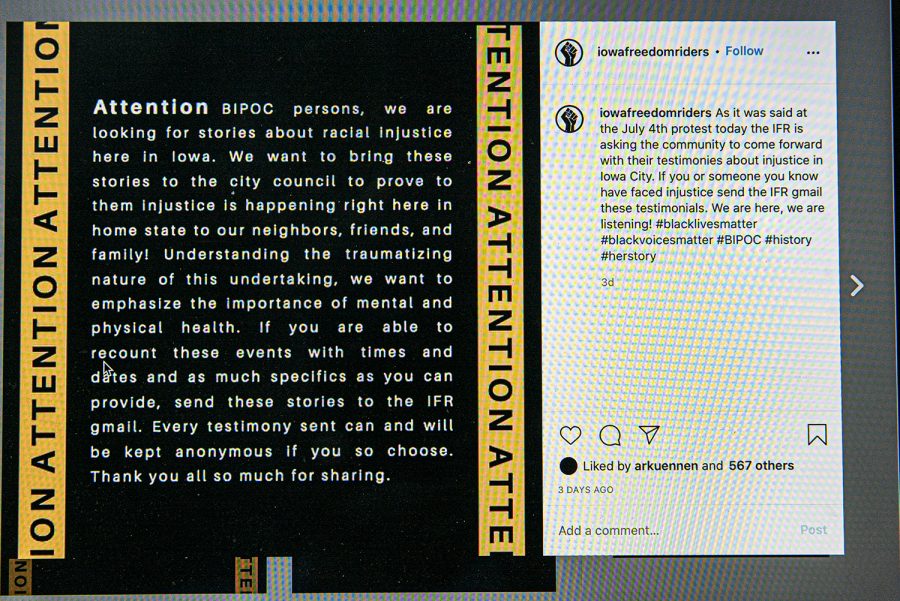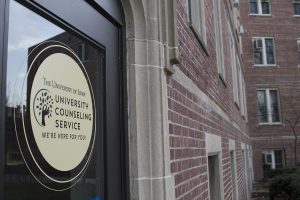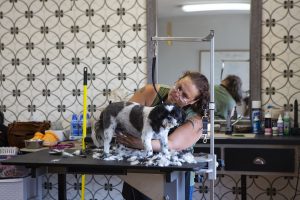Iowa Freedom Riders seek to share personal stories of racial injustice with Iowa City City Council
The organization hopes testimonies from the community will make people feel heard, and show the city council that racism is just as much of a problem in Iowa City as it is elsewhere.
An Instagram post made by the Iowa Freedom Riders is seen on Wednesday, July 8, 2020. The Iowa Freedom Riders are using social media to gather testimonials from BIPOC to share with the Iowa City Council.
July 9, 2020
The Iowa Freedom Riders (IFR) announced at a protest on Independence Day that they wanted Black, Indigenous, and people of color (BIPOC) in the community to share their stories of racial injustice in Iowa with the Iowa City City Council. The organization followed up with an Instagram post on the same day, asking people to share their testimonies with its email account.
The Iowa Freedom Riders are currently in the process of gathering these stories. Wylliam Smith, an activist who works with the group, said he doesn’t know yet when IFR will choose to share them with the City Council.
“We are going to bring these stories to city councilors because we’re not going to let them sit here and say this stuff isn’t happening, and/or that if it is happening, it doesn’t mean anything — or it’s not as bad as it could be,” Smith said.
Editor’s Note: Wylliam Smith is a former columnist for The Daily Iowan.
City Councilor Laura Bergus said attending marches and Speak Up, Speak Out events where Black people have shared their experiences of racism and oppression has been informative for her.
She described one individual who at Speak Up, Speak Out explained their feelings of erasure growing up and that their point of view and experiences were invalid. That speaker was Wylliam Smith’s sibling, Akia Nyrie Smith, who is a member of IFR.
Wylliam Smith said that erasure is the reason some people don’t understand what is happening to people of color, and that’s why sharing these testimonials is important.
“Either A, they’re erasing the narrative of the Black people here; B, they are saying ‘Well you should expect that, it’s the Midwest, there’s not a lot of you, so it’s racist’ and C, they’re saying that it is not as bad as it could be,” he said. “And all of those things are gaslighting techniques — all those things are erasure techniques to silence the stories that are happening.”
He added that having these conversations about race in the Midwest can be difficult because of a prevailing trope of “niceness” in the Midwest. He said the idea of general niceness influences people’s worldviews.
Bergus agreed, saying that subtle racism can be harder to identify and call out in that sort of environment.
Testimony writers have the option of remaining anonymous when sharing their stories with IFR, and Wylliam Smith said the group doesn’t want to put anyone at risk when they share their story. Some submitters might not want their story shared in public at all, he added, but may just want their experience to be heard by the IFR in a safe space.
RELATED: Iowa Freedom Riders continue push for change with Fourth of July protest
“Someone’s testimonial that you’re asking for is digging through a traumatic experience that they endured. Whether it’s someone pulling your hair on the side of the street or whether it’s a cop pulling you over and pointing the gun at you,” Smith said. “It’s a traumatic experience. And also it’s a traumatic experience that many BIPOC people face every single day.”
City Councilor Janice Weiner said when she was growing up in the area in the ’60s, there weren’t many people of color, and that has changed for the better.
“Part of the challenge right now is to really … help people want to open their eyes and find that it’s necessary to open their eyes and find that in addition to whatever they have experienced, there have been very different experiences in the same community. And that it’s in their interest to learn and become educated on all the different experiences, including some very negative experiences that take place in our community,” Weiner said.





